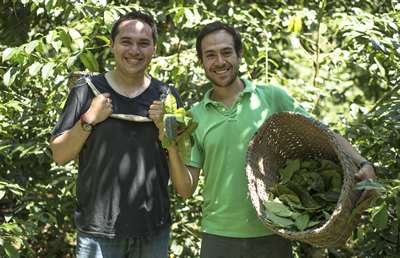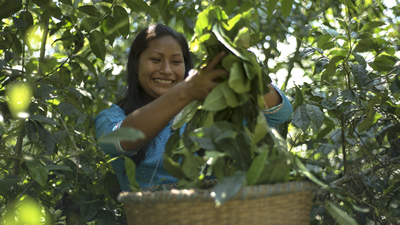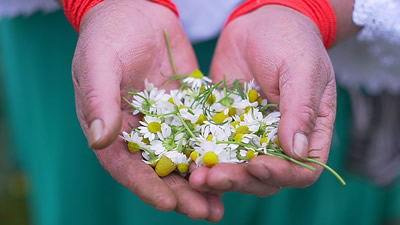Two tea-makers from Ecuador are proving that the right entrepreneurial network and support system can brew social businesses that are ready to export.
An Ecuadorian duo have discovered a fair way to trade tea as they scale production, thanks to market demand and a unique entrepreneurship network focused on supporting their kind of innovative ventures.
For centuries, tea was used only as a medicine. It took almost 3,000 years for it to become a daily drink, but now is the most popular thirst-quencher in the world after water.
An industry of its size and popularity means the tea sector is a sought-after market, yet it is also fraught with questionable practices.
There does not need to be a mismatch between economics and ethics though. And award-winners Demetrio Santander of Waykana Guayusa and Guillermo Jarrín of TippyTea are proof you can make money while making a difference.

Both have plotted a pathway to sustainable companies that pay growers fairly and protect native biodiversity.
Demetrio and Guillermo emerged out of a groundbreaking network of 250 public, private and academic stakeholders built to support entrepreneurs like them, Ecuador’s Alliance for Entrepreneurship and Innovation (AEI).
Created in 2013 with UNCTAD support via the UN Development Account project, to promote an innovation ecosystem in Ecuador, AEI's assistance to the two tea makers is steeped in its commitment to making the country attractive to entrepreneurs, says UNCTAD economist Fulvia Farinelli.
Their incubation system helped both tea companies grow beyond Ecuador’s borders.
The Amazon’s energy leaf

Demetrio’s desire to harness the energy properties of the unique Guayusa leaf, but with small indigenous leaf growers in the Ecuadorian Amazon rainforest, saw him launch Waykana, an ethical, organic energy tea company, with co-owner Juan David Gomez.
It all started with an epic coast-to-canopy adventure after Demetrio finished his master’s in law and finance at the University of Oxford.
The partners found themselves deep in the Amazonian rainforest experiencing a pre-dawn Guayusa leaf infusion ceremony with members of the indigenous Kichwa community.
It would energize them for the rest of the day and change their lives forever.
From that moment their passion for Guayusa has not flagged, as they grew the company from idea in 2015, to the country’s number one processed leaf supplier by 2019.
Now, it makes everything from loose-leaf tea and tea bags, to energy drinks, extracts, and even Guayusa gummies, all harnessing the leaf’s energetic properties.
Guayusa is one of the most caffeinated leaves known to humanity. It has more caffeine than black and green tea and as much caffeine as coffee.
It’s also got the good stuff: antioxidants, polyphenols, L-theanine and amino acids.
“This combination offers the consumer a healthy energy boost with no side effects, like the jitters you get when drinking coffee or artificial energy drinks,” says Demetrio.
Waykana now exports to over 10 countries. Two thirds of its sales are from outside Ecuador, mainly in the Asian and United States markets.
“We export to China, the Middle East, South Africa, and North America, and we are looking to enter the European market in high volumes this year,” Demetrio says.
“During our first year, we broke the record for local start-ups exporting from Ecuador reaching nine countries by month twelve,” Demetrio says.
It’s been a ride made easier by a powerful vision, he says.
“We do this to improve the livelihoods of our growers, save the environment, especially the Amazon jungle – the lungs of the world –and bring healthy energy to the entire world,” he says.
“Being able to say we make money through a business that helps the Kichwa indigenous communities and saving the environment is simply our motivation,” Demetrio adds.
He and Juan David work collaboratively with 150 traditional Amazonian family farmers located in four provinces in Ecuador, paying them above fair-trade prices and helping improve their living standards.
And since Guayusa is native to and only grows in Ecuador, the initiative is helping the South American nation make the most of its unique natural capital.
The country owns 95% of the Guayusa value chain.
“We are the first Guayusa supplier in the world, using the most modern technology to process tea and herbs in the country,” Juan David says.
“Being number one in the world is not easy. But the opportunity to help people achieve their dreams every day using clean energy from the Guayusa leaf, is a gift we want to keep on giving,” he adds.
Meanwhile, TippyTea’s Guillermo has broken new ground working with indigenous women to protect the link between native plants and the cultural identity of the communities that harvest them for their health-giving properties.
Now about 250 families in the canton of Cotacachi in northern Ecuador are also getting a fair price for the tea, herbs and fruit they grow thanks to Guillermo’s innovative venture.

Tea for two
Both tea companies have raked in the awards – and grown with AEI’s support.
They each won the AEI award for the most entrepreneurial start-up in Ecuador in 2016 (TippyTea) and 2018 (Waykana).
Then, in a tandem of fate, both also were chosen to represent Ecuador in 2017 and 2018 at the United Nations Global Entrepreneurship Week: Start-Up and Scale-Up for the Sustainable Development Goals in Geneva, Switzerland.
The event features projects from different parts of the world that show how business and the goals could be aligned.
Waykana won the 2018 edition and with TippyTea placing among the top 10 finalists in 2017, it’s clear a tantalizing Ecuadorian tea party is on.
But what is also special about the network which infused these two companies with the ingredients for success, is its approach.
Guillermo and Demetrio’s success partly reflects the fruitful collaboration between UNCTAD and partners in Ecuador.
In 2015, AEI partnered with UNCTAD to prepare a national entrepreneurship strategy and related action plan.
The goal is to make Ecuador one of the three most attractive countries in the Latin American region to start-up a business and innovate.
Its annual competition to award the most active implementer of the action plan from both the public and private sector is driving the kind of in-country innovation seen from the tea makers.
Demetrio says the partnership gave his company access to mentors and industry experts.
“AEI opened a business network and retail channels for us, and they are working on helping build an angel investor network,” he says.
The network does several other important things, says Ms. Farinelli. “It collects and analyses data on the entrepreneurial ecosystem.”
“Critically it has also established a venture capital fund that allows entrepreneurs to launch innovative projects, and upgrade financial literacy and inclusion,” she says.
Children and young people in schools and colleges also benefit from the training to develop entrepreneurial soft skills such as leadership, creativity and innovation. AEI also hosts an annual entrepreneurship boot camp with 3,000 hours of training to young people.
The network operates in Quito, Guayaquil, Cuenca and Manta.
“Its method has seen the AEI succeed in blending the right mix of talent and support,” Ms. Farinelli adds. “And its changing Ecuador’s entrepreneurial outputs for the better.”


